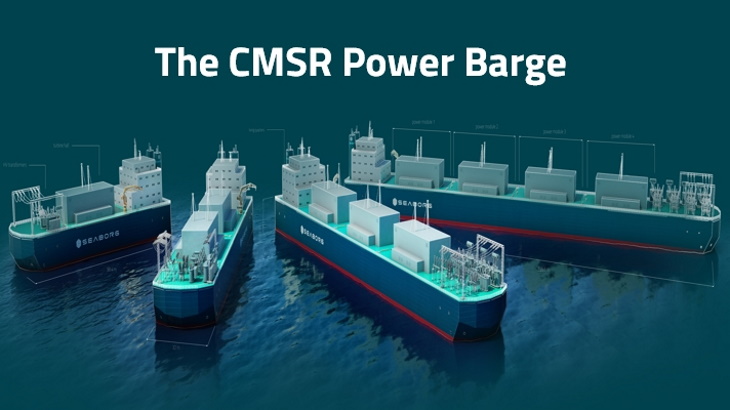Samsung completes design of CMSR Power Barge
South Korean shipbuilder Samsung Heavy Industries (SHI) has completed the conceptual design for the CMSR Power Barge - a floating nuclear power plant based on compact molten salt reactors - and obtained the basic certification of the design from the American Bureau of Shipping (ABS).

The Power Barges are modular and can produce from 200-800 MW of electricity (Image: SHI/Seaborg)
In December 2020, ABS said it had completed a new technology qualification of a compact molten salt reactor (CMSR) developed by Danish company Seaborg Technologies. The concept was found to satisfy the Feasibility Stage, the first milestone in the ABS New Technology Qualification process.
In April last year, SHI and Seaborg signed a Memorandum of Understanding to manufacture and sell turnkey power plants combining SHI's ship-building expertise and Seaborg's CMSR. It also covered the development of hydrogen production plants and ammonia plants.
Seaborg's design is for modular CMSR power barges that can produce between 200 MW and 800 MW of electricity, with an operational life of 24 years. Instead of having solid fuel rods that need constant cooling, the CMSR's fuel is mixed in a liquid salt that acts as a coolant, which means that it will simply shut down and solidify in case of emergency.
ABS has now issued an Approval In Principle (AIP) to SHI for using the CMSR design in the CMSR Power Barge.
As part of the Novel Concept Class Approval process, ABS grants an AIP at an early conceptual design phase to assist the client in demonstrating project feasibility to its project partners and regulatory bodies. AIP confirms that the proposed novel concept that includes the new technology complies with the intent of the most applicable ABS Rules and Guides as well as required appropriate industry codes and standards, subject to a list of conditions.
SHI said the CMSR Power Barge can be equipped with two to eight 100 MW CMSRs in accordance with demand for power production. It describes the CMSR Power Barge as "a fusion of nuclear power and shipbuilding technology", adding that it is "a 'nuclear power plant on the sea' with steam turbine generators and transmission/distribution facilities in the floating body". The company says that compared with conventional land-based nuclear power plants, "the site selection and facility constraints are relatively less demanding, the construction period is as short as about two years, and the cost is low".
SHI plans to commercialise the CMSR Power Barge by 2028 once the detailed design of all of the plant's power generation facilities has been completed.
It noted Seaborg is actively conducting sales activities targeting developing countries that lack permanent electricity.
SHI said it expects the CMSR Power Barge to "expand demand not only as an alternative demand for existing fossil fuel power generation facilities, but also as an electricity and thermal energy source for industrial heating systems, hydrogen production, and seawater desalination facilities".
"We will complete the product that will lead the future new market through continuous technology development and commercialisation efforts for floating nuclear power plants," said Yeo Dong-il, head of offshore design at SHI.
Researched and written by World Nuclear News
- China Institute of Atomic Energy
- Nuclear Power Institute of China
- Southwestern Institute of Physics
- China Nuclear Power Operation Technology Corporation, Ltd.
- China Nuclear Power Engineering Co., Ltd.
- China Institute for Radiation Protection
- Beijing Research Institute of Uranium Geology (BRIUG)
- China Institute of Nuclear Industry Strategy (CINIS)
- China Nuclear Mining Science and Technology Corporation


